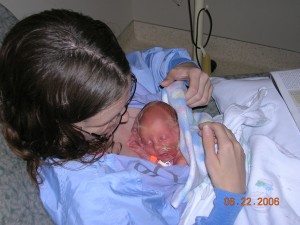 Today, May 15, in observance of Kangaroo Care Awareness Day, Attachment Parenting International (API) honors all mothers and fathers who have given the gift of skin-to-skin contact to a newborn.
Today, May 15, in observance of Kangaroo Care Awareness Day, Attachment Parenting International (API) honors all mothers and fathers who have given the gift of skin-to-skin contact to a newborn.
While Kangaroo Care was first promoted for its life-saving benefits to premature and at-risk infants, it has — since its discovery in 1980 in Colombia — become a mainstay in getting breastfeeding and mother-baby bonding off to a good start.
Skin-to-skin contact, as Kangaroo Care is also called, is more than just a nicety, though. It is essential for healthy infant development, as well as maternal well-being. It’s important that we recognize and promote this.
The benefits for baby include accelerated brain development; less crying; reduced cortisol (stress hormone) levels; better regulated body temperature, heart rate and breathing; better quality sleep; enhanced immune system; stimulated digestion and therefore better weight gain; and more effective breastfeeding behavior.
Combine this with the benefits for mother — decreased risk of postpartum depression, increased milk production, increased pain tolerance, and reduced postpartum bleeding, cortisol levels and blood pressure — and skin-to-skin contact looks to be an incredibly important part of newborn care!
Kangaroo Care has a special place in my heart. It was through this simple practice — undress baby to the diaper and place on mom’s, or dad’s, bare chest — that was my introduction to Attachment Parenting. Kangaroo Care helped me to bond with my preemie and was the first domino to tip in the trajectory of my parenting journey. If the nurses hadn’t suggested Kangaroo Care, and instead left my baby in the incubator in those early days when my sense of motherhood was most fragile and yet impressionable, I don’t know what approach to parenting I might have adopted but I do know that it would have taken me much longer to get to the current place in my parenting journey.
I have now come full circle.
In my work of supporting parents, I routinely suggest skin-to-skin contact to both mothers and fathers, whether or not they plan to breastfeed. Nurturing touch is not only powerful in the beginning chemistry of attachment, including bonding and breastfeeding, but also in gently moving even the most obstinately detached parents toward an attachment-based family dynamic — courtesy of oxytocin, the hormone responsible for that intoxicating feel-good state of mind that comes with Kangaroo Care.
How parents bond with their infant can make a huge difference in that child’s life. Kangaroo Care, for both preterm and full-term babies, is a way to positively influence that initial bond.
Highlighted API Resources on Kangaroo Care
“Attachment Parenting” with actress Mayim Bialik, an API Teleseminar — recordings only $9 each!
“Developing Emotional Attachments in Adopted Children” by API Cofounder Lysa Parker, coauthor of Attached at the Heart
From API’s magazine, The Attached Family:
“The Importance of Skin-to-Skin Contact” by Dr. Jack Newman and Teresa Pitman, coauthors of The Latch and Other Keys to Breastfeeding Success
From API’s blog, APtly Said:
